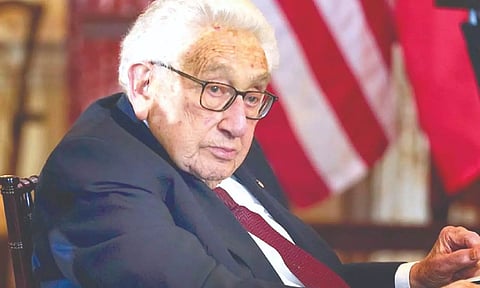

WASHINGTON: After a visit to the Palace of Versailles outside of Paris in the 1970s, journalists asked Henry Kissinger what it was like in the majestic Hall of Mirrors, to which he responded it was “wonderful” as he was “surrounded by genius.” For supporters, Henry Kissinger is indeed a diplomatic genius who continues to master the art of discerning the politically achievable like no other. For critics, he is a war criminal. For most, he and his political legacy fall somewhere in between.
During Kissinger’s time first as a foreign policy adviser and later as secretary of state to Presidents Richard Nixon and Gerald Ford, he contributed to ending the Vietnam War, entering a détente with the Soviet Union, opening US relations with China, overthrowing a democratically elected leader and redrawing the borders of several countries. After leaving office, he went on to offer “geopolitical consulting” to scores of undisclosed international leaders with his Kissinger Associates consulting firm.
Even 100 years after he was born Heinz Alfred Kissinger to a Jewish family in the Bavarian city of Furth, Kissinger is seen as an international foreign policy heavyweight and contributes his views on geopolitical issues. He has often warned of the dangers artificial intelligence pose for the world. Putting AI into the same league as the danger from nuclear weapons, he warns his younger peers that this is a “totally new problem.” Quite a warning by a man who has seen it all. ‘On Russia’s full-scale invasion of Ukraine, Kissinger created a furore by calling for a negotiated peace in November. His appeal came at a point when Ukraine’s Western allies had only just started substantively ramping up their military assistance to Kyiv. While Kissinger argued imminent talks were necessary to avoid another devastating world war, Kyiv accused him of “appeasing the aggressor.”
Ken Lieberthal, who worked with Kissinger on several occasions over the past decades, said the centenarian has “a clear view of what needs to be done” and “how to get from here to there.” Kissinger’s approach requires “an unsentimental assessment of capabilities,” Lieberthal explained. A devoted proponent of Realpolitik, Kissinger himself described his thinking about conflict in an even more straightforward manner: “the ends justify the means.”
Ukraine’s criticism leaves Kissinger unfazed. When it comes to dealing with Russia, Kissinger, who masterminded America’s détente policy in the 70s, can point to having been at the edge of war with Russia himself. Later he described detente as “a strategy for conducting the conflict with the Soviet Union” that bought both sides time for diplomacy and avoiding a hot conflict.
In a rare change of mind, he now backs Ukraine’s future membership in NATO after he concluded that “the idea of a neutral Ukraine in these conditions” was “no longer meaningful.” But his willingness to see principles of international law and human rights not as paramount, but simply one factor in his policy equations has human rights advocates around the world on edge as soon as they hear his name. US Senator Bernie Sanders, a leader of America’s political Left, said he was “proud to say that Henry Kissinger is not my friend” calling him the “most destructive secretary of state in modern history” over his policies in Asia in the 1970s.
Kissinger has described his often controversial take on strategic leadership as “traversing a tightrope” that is “suspended between the relative certainties of the past and the ambiguities of the future.”
This article was provided by Deutsche Welle